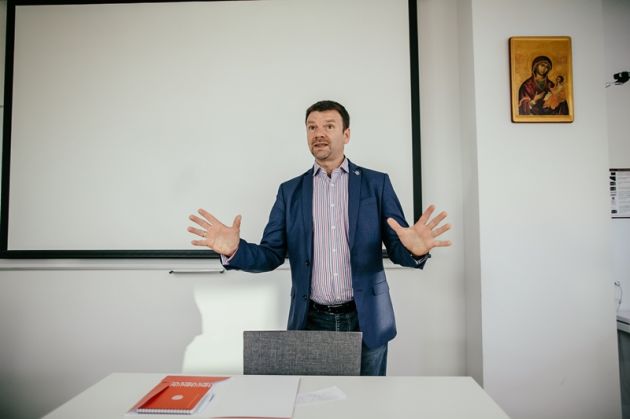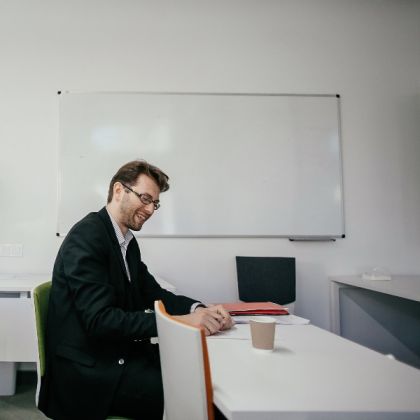Do you want to improve your knowledge of English Law but don`t know where? One of such opportunities is attending English Law and Legal Skills Program within The Ukrainian Catholic University British Law Centre. Teachers of this Program Steve Terrett and Krzysztof Garstka explained to ‘Yurydychna Gazeta’ what students should learn to be competitive, what differences are in cultural approaches and how technology influenced legal profession.
 |
Маєте Телеграм? Два кліки - і ви не пропустите жодної важливої юридичної новини. Нічого зайвого, лише #самасуть. З турботою про ваш час! |
– Can you tell about your first impression of Ukraine and the level of knowledge of Ukrainian lawyers (students)?
– Steve Terrett: Students of our program are a mix of actual students, mainly of Ukrainian Catholic University, and practicing lawyers both junior and senior practicing lawyers. It’s a very wide spectrum of people from first year law school to 20 years post practice. I can describe them as very passionate, keen to learn, full of energy students. When I come out from the classroom I feel more energy than I had when I came in. I’m stealing their energy [laughing] and it`s great that they are keeping giving energy to us.
If you’re asking about the level of their knowledge, it begs the question, knowledge about what? Regarding to the knowledge of things that we teaching them – everyone is equal, because it doesn’t matter whether you’re 20 years qualified, or you are a first year law student – most of them don’t know English law. It’s a great leveler. We give them a lot of material to deal with but they are very intelligent. In fact, in Ukraine we are spending twice as much time with the students, in comparison with other places. We work as much as 8 hours per visit, which is longer than normal. In English we say, ‘Time flies when you’re having fun,’ and we are having a lot of fun, because 8 hours disappear very quickly.
– Krzysztof Garstka: One thing I`d like to add is how quickly Kyiv students relate their knowledge of Ukrainian law to very complex problems of UK constitutional law, for instance issues related to injunctions. That impressed me a lot.
– S: What is important to understand is that we don’t come as some kind of British imperial project to bring their knowledge to people who know nothing. We’re not like missionaries coming to Africa bringing knowledge of civilization. Our students know a lot about Ukrainian legal system and they are interested in how things are done differently in other countries. If you were to pick anything in English law, it would look very strange in comparison with Ukrainian law. So we are learning about Ukrainian law just as students are learning about English legal system.
– And do you like our system?
– S: It’s interesting to hear that some parts of Ukrainian law have changed, and they have become closer to English law. For instance, now in your criminal procedure you have cross-examination, where you can ask questions of witnesses. There is no such mechanism in other countries, where we teach the course (for example, Hungary, Bulgaria, Czech Republic, Slovakia etc.) It’s great to see where there are similarities and where there are differences.
– What is your course about?
– S: It’s a mixture of core legal substantive law and soft skills. First of all, we get familiar with the English legal system, and then look at contract law, tort, and trust. Trust is always the strange one because most countries don’t have an equivalent of Trust law. These are the most common core commercial subjects that you will learn in the UK. At the same time, we also teach legal skills and use these substantive law modules as the background to teach a relevant legal skill. Now we’re teaching all of legal advocacy and how to prepare a case for court, and to deliver it in court. Later on during the course we would be looking at drafting contracts, negotiations, preparing memorandum for clients etc. So it gives a flavor not only of what the English law is, but also what it’s like to practice it.
This course shows the difference in philosophy or the difference in approach to the relationship between a lawyer and a client; to the relationship between a lawyer and a court. It could be interesting even for lawyers who have been practicing in Ukraine for 20 years, because it gives them a new perspective on their own approach to clients with understanding how other people do it in other countries. By seeing differences, it helps us understand what we do and why we do it that way.
– In what kind of cases in Ukraine they can apply this knowledge?
– S: They can use it everywhere. Every lawyer has clients, and every lawyer needs to think about how to approach their clients. I have no idea about what legal skills training is like in Ukraine, but in many of the countries we visited legal skills training is not really taught. If you want to be a lawyer, you need such skills and there are not a lot of places where you can learn them. Maybe you learned from someone or maybe you didn’t, but it’s not very formalistic in terms of what we should learn and how to teach it. And one of the things that the UK legal system can be proud of is that there is a very systematic approach towards teaching legal skills and a lot of thoughts have come to how we should teach. Even if the law is different, we all have clients, we all have courts, we all have colleagues that we need to deal with. What is taught to lawyers in UK, students from other countries can find very interesting and useful.
– K: Yesterday, one of the students said that he started to understand why when he worked on contract drafting with people from UK within his business they amended the contract in a specific, kind of unstructured way with a lot of amendments. When we discussed a lot of laws from the UK, the same approach that he noticed in his UK colleagues was visible there. He remarked that it was more of a cultural thing.
– How does a young lawyer become a true professional? How can she/he grow along the career ladder, and be not lost among the rest of the colleagues?
– S: If you are a student, and you know there is a thousand of students who are going to graduate with you, and you are looking for job, there are no a thousand jobs. Then you have to do something that makes you stand out from the rest of the crowd. One way how you could do that is our diploma. Because if you graduate, it says that your level of English is good enough to deal with English law, with English lawyers, and making arguments in English all the time.
Also there are cross-cultural aspects. And one thing that I found noticeable is how direct Ukrainian students and lawyers can be. They are not afraid saying ‘that`s wrong’. When we come from UK it is quite unusual and it takes a little bit of time to get used to differences between the cultural approaches. But I also think that participants of our course are much more used to the expectations of English nationals. Like when a Ukrainian person shouts and says ‘you’re wrong’, he doesn’t think he is rude, but it’s not common for an English person. The same way, when the English person talks to the Ukrainian and doesn’t say what he really means, the Ukrainian might get frustrated thinking, ‘What are you telling me?’ or ‘What do you mean?’ It happens because the English person expects you to read between the lines, so he doesn’t have to say that out loud. So it’s not only exposure to the language, but exposure to the culture. And such soft skills can be very useful for postgraduates.
And thirdly, when you see how other countries approach the same problem, it makes you look at your own system inside and think that maybe we could do things a little bit differently. It could help use advantages of many different countries.
– What are the other major problems with the legal education? Should anything be changed in this sphere? In your opinion, what legal school is the best one?
– S: There is no doubt about what legal school is the best one. It’s Cambridge University! [laughing] The problem of the legal education is a very philosophical question. It all depends on what we are trying to do with the legal education. If we are trying to turn students into practicing lawyers, we should teach them practical legal skills as we would teach a doctor how to treat the body. In this situation, one problem with the legal educational in many counties is that it is not practical enough. It’s too theoretical. So after finishing a law school, students are not ready to be lawyers. Our aim is not to produce young practicing lawyers, but to open up people’s minds and make them think and question everything. Here the problem is that teachers are not ready for such approach. To open someone’s mind they should be ready to be questioned and argue. So the problems are that sometimes a law course is not practical enough, but also not thought-provoking enough.
– K: When I was doing the first year of my bachelor degree in UK, we already had contract negotiations. At the same time a colleague of mine, who was a fourth year student from Poland, hasn’t done any legal skills of this kind. It felt weird when we were pushed to negotiate and present the case, when we barely understood what the law was. But overall, this exercise had a good impact on the way I see law and think about it.
– Dr. Garstka, in your researches you have comprehended the impact of copyright enforcement mechanism on cultural diversity. Is it possible to determine the reverse dependency, when vice versa the culture diversity makes impact on the legal system and legal mechanisms?
– K: Yes, the cultural diversity is what shapes our social norms, like what is acceptable and what is not. In its turn that can translate into how much weight the society places on the copyright enforcement. There is an ongoing reform of EU law copyright system and because of cultural diversity people value having different faces of culture. People might feel more inclined to protect it, to keep a closer eye on the digital platforms. It’s an ongoing dialog between cultural diversity and copyright enforcement.
– So what should be changed in Ukrainian culture features to improve our law system and to make it more steady? How could we create necessary conditions for the implementation of the world's best achievements in our legislation?
– S: It’s difficult for non-Ukrainians to have a very strong opinion about it, so my thought will be based on experiences from other countries. For example, your neighbors – Poland. Their Parliament produces hundreds if not thousands of statutes. When you produce so much of products, it’s very difficult to make it of a good quality. I’m not saying that in UK all statues are wonderful, but generally there are 30 statutes per year. It means that in countries like Poland the law is constantly changing. But stability at the law system is a very important feature. If the law is constantly changing, then it’s very difficult for people to know what they are supposed to do. That creates a lot of work for lawyers but I think the UK system shows that lawyers are not short of work either, when the law is stable. I think that it’s fair to say that the politicians in post-soviet countries like to show acting very much and quickly changing a lot, what leads them to adopting lots of statutes. Then you have a new election and a new government and it repeats again. Sometimes the main question should be how to keep what we already have even it’s not perfect, because it won’t be perfect anyway.
– How have cultural approaches been changed after implementation GDPR within EU?
– K: They have changed quite substantially. Data protection law has been around for a while, but GDPR obviously generated a lot of interest mainly because of the potential fines that data controllers can face for non-compliance. But people are becoming much more conscious of the power lying in the personal data. People are learning more and more what those companies, those often innocent-looking companies (like Google, Facebook) can (in theory) do with your data, if they pull it together. What the government can do with your data, if they pull it together. So one of the changes you can notice is people become reluctant when somebody ask them to give their email or post code, their signature. And this is a good thing. It changed the cultural approach and gave more understanding of the fact that many private entities (Google, Facebook and so on) are providing, conducting a public function – they are providing a space for us to exchange information. So as a result, society might come to accept that those entities should follow specific rules. Rules that you associate with a strategic, infrastructural provider. Overall, GDPR is a kind of next step, but it’s not the end of the road. This branch of law will evolve with the cultural approaches.
– S: At pre-GDPR everyone starts going crazy about what’s going to happen because of the misunderstood what it says. What we can see now is the calm after. Now we understand it’s not so bad as we thought it was. But also we are in the period before the European court of justice starts to use it and large companies start having huge fines. When this happens, maybe we would see the second wave of fear. But I hope that if we are driven by common sense, life will be good.
– Technologies are changing the legal landscape really fast. Now it is an inalienable part of the legal services. What do you think about the scope of technological influence on the legal profession in the context of doing business in the sphere of law?
– S: First of all, the increased role of technologies is unavoidable. So there is no point acting like an ostrich, digging a hole and putting your head in a sand. Technologies are already here. It was discovered that many functions that traditionally had been done by a junior lawyer, now could be done by very sophisticated software. And that aspect is both worrying and exiting at the same time. Worrying in the sense that every junior lawyer needs a space to develop their skills. You don`t want your first contract to be multi-billion pound, you want to cut your teeth and get familiar with something that is baby-steps. Much of that easy work that allows to build some confidence about legal skills, maybe would be done by Microsoft. It’s worrying because throwing people in the deep end of the swimming pool before they learned to swim it’s not right. But on the other hand, younger generation is more familiar with technologies. And perhaps it’s wrong to worry about whether the youngsters will work with technology. Perhaps it’s more of the threat to the older generation, who are not familiar with it. I’m won’t be able to embrace it, to use its fullest potential as youngest generation can. It’s unavoidable, we have to be used to it.
– K: I don’t think that lawyers can be fully replaced. But those simpler initial tasks may be increasingly digitized. And another field it’s online content regulation. Right now we have hundreds of bots submitting those notices. How far is it going to go I don’t know, but now it’s only the initial mechanical tasks. Overall, robots can be supportive on some deeper level analysis, but not replacing the person.
– What skill is more important for lawyers: oral advocacy or legal writing?
– S: Common sense. Normally by the time you’re writing to someone in law, then the situation is a dispute. So I thing talking is normally the best option. Oral advocacy. But if it means oral advocacy in court – it’s too late.
– K: Given our previous question I will also say oral advocacy, because it’s much more difficult to be replaced by robot.
– Knowledge of substantive law or procedural law?
– S: Knowledge of people. But if you have to have a choice between those two, then knowledge of substantive law.
– K: Both. It’s like asking which wheel of a bicycle is more important. But I guess it’s substantive law, because it is easier to catch up with procedural law than with substantive.
– In IP (intellectual property) which pattern is better – pay for what you like or use content for free with watching bunch of commercials?
– S: Like Netflix vs YouTube? Than Netflix. But as the concept – watching content for free is better, because people who can’t afford Netflix can always watch YouTube, where everyone pays price with their time.
– K: I would say it depends on the type of content. When we talk about high quality, TV series, movies – things that we want to be long-term, then in this case I think that the Netflix subscription model makes sense. But I don’t think it will make sense for a platform based on short clips, music videos, news, and funny things. Plus, “free” YouTube’s model is better for cultural diversity.
– What works better – imperative norm of law or dispositive? Tough rules or hope for integrity and law-abiding citizens?
– S: I think the history shows us that trying to control people with a stick or a gun can be extremely effective for a short period of time. But sometimes this short time can feel very long if you are on a wrong side of a gun. But it never lasts, so ultimately society only works because we all treat each other with respect, and we all know that we’re in the same team. So dispositive norms work better rather than tough rules. And if you have no hope for integrity but you have tough rules, then life doesn’t sound very pleasant.
– K: I would say imperative norms of law are required, but during the implementation – you should look towards dispositive. So you should strive for dispositive, but don’t be afraid to use imperative wisely.
– Fines or incentives?
– S: The carrot or the stick? [laughs] Psychology says that in long term positive reinforcement is much more effective than negative reinforcement. That means if the carrot is always going to be more effective than the stick. But it doesn’t mean that life can be just a series of carrots, there have to be some sticks involved as well. So if you only have to choose one – take the carrot, but realize that on its own it will be not as effective as a combination of a carrot and a stick together.
– K: And sometimes you don’t even have to use the stick. Just the presence of a stick can do a lot. It’s not like data protection authorities are just looking for mistakes to impose a fine, but you better take in mind that it can be used, when you plan your operations.
– What system is preferable for business – Common Law or Civil Law?
– S: I think the average businessmen or women wouldn’t really care, they would say I want something stable, predictable, and reliable. And that can be that neither common law, nor civil law has a monopoly over those characteristics. So the business just wants to know what they’re investing in and that could be a common law system or civil law system.
– If it wasn`t law, what sphere would you choose?
– S: I’m still waiting for Bono to retire as being the lead singer of U2, and still hoping that my CV will be waiting on their desk someday. You may say that’s optimistic, but Prince Charles has been waiting for a very long time.
– K: I would either try and fail to write a cyberpunk or the Sci-Fi novel, or maybe go back to that guitar I have. But I’m absolutely happy with law.
– S: As a final word, I would like to say that recruitment has already finished for the 2018-2019 Diploma, but anyone who is interested in learning more about the Diploma can visit our website and stay in touch with us by Facebook. We’d be delighted to receive your application next year for the course that will start in October 2019!







